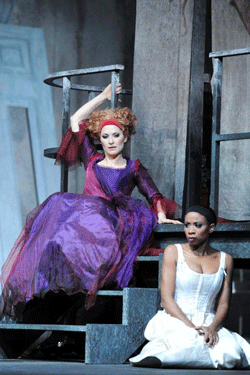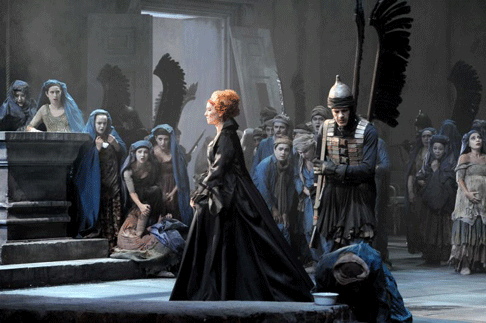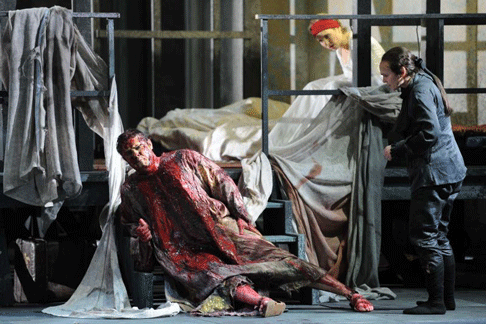![Almas Svilpaas as Hercules and Marie-Helen Joel as Lichas [Photo by Thilo Beu courtesy of Aalto-Musiktheater]](http://www.operatoday.com/1614_2045_Hercules-0338.gif)
13 Dec 2011
Colossal Hercules in Essen
Apparently the Aalto Theater didn’t get the memo that oratorios often make weak theatre pieces, since the company presented such a gripping dramatic case for Handel’s Hercules.
English Touring Opera are delighted to announce a season of lyric monodramas to tour nationally from October to December. The season features music for solo singer and piano by Argento, Britten, Tippett and Shostakovich with a bold and inventive approach to making opera during social distancing.
This tenth of ten Live from London concerts was in fact a recorded live performance from California. It was no less enjoyable for that, and it was also uplifting to learn that this wasn’t in fact the ‘last’ LfL event that we will be able to enjoy, courtesy of VOCES8 and their fellow vocal ensembles (more below …).
Ever since Wigmore Hall announced their superb series of autumn concerts, all streamed live and available free of charge, I’d been looking forward to this song recital by Ian Bostridge and Imogen Cooper.
Although Stile Antico’s programme article for their Live from London recital introduced their selection from the many treasures of the English Renaissance in the context of the theological debates and upheavals of the Tudor and Elizabethan years, their performance was more evocative of private chamber music than of public liturgy.
Evidently, face masks don’t stifle appreciative “Bravo!”s. And, reducing audience numbers doesn’t lower the volume of such acclamations. For, the audience at Wigmore Hall gave soprano Elizabeth Llewellyn and pianist Simon Lepper a greatly deserved warm reception and hearty response following this lunchtime recital of late-Romantic song.
For this week’s Live from London vocal recital we moved from the home of VOCES8, St Anne and St Agnes in the City of London, to Kings Place, where The Sixteen - who have been associate artists at the venue for some time - presented a programme of music and words bound together by the theme of ‘reflection’.
'Such is your divine Disposation that both you excellently understand, and royally entertaine the Exercise of Musicke.’
‘And there was war in heaven: Michael and his angels fought against the dragon; and the dragon fought and his angels, And prevailed not; neither was their place found any more in heaven … that old serpent … Satan, which deceiveth the whole world: he was cast out into the earth, and his angels were cast out with him.’
There was never any doubt that the fifth of the twelve Met Stars Live in Concert broadcasts was going to be a palpably intense and vivid event, as well as a musically stunning and theatrically enervating experience.
‘Love’ was the theme for this Live from London performance by Apollo5. Given the complexity and diversity of that human emotion, and Apollo5’s reputation for versatility and diverse repertoire, ranging from Renaissance choral music to jazz, from contemporary classical works to popular song, it was no surprise that their programme spanned 500 years and several musical styles.
The Academy of St Martin in the Fields have titled their autumn series of eight concerts - which are taking place at 5pm and 7.30pm on two Saturdays each month at their home venue in Trafalgar Square, and being filmed for streaming the following Thursday - ‘re:connect’.
The London Symphony Orchestra opened their Autumn 2020 season with a homage to Oliver Knussen, who died at the age of 66 in July 2018. The programme traced a national musical lineage through the twentieth century, from Britten to Knussen, on to Mark-Anthony Turnage, and entwining the LSO and Rattle too.
With the Live from London digital vocal festival entering the second half of the series, the festival’s host, VOCES8, returned to their home at St Annes and St Agnes in the City of London to present a sequence of ‘Choral Dances’ - vocal music inspired by dance, embracing diverse genres from the Renaissance madrigal to swing jazz.
Just a few unison string wriggles from the opening of Mozart’s overture to Le nozze di Figaro are enough to make any opera-lover perch on the edge of their seat, in excited anticipation of the drama in music to come, so there could be no other curtain-raiser for this Gala Concert at the Royal Opera House, the latest instalment from ‘their House’ to ‘our houses’.
"Before the ending of the day, creator of all things, we pray that, with your accustomed mercy, you may watch over us."
The doors at The Metropolitan Opera will not open to live audiences until 2021 at the earliest, and the likelihood of normal operatic life resuming in cities around the world looks but a distant dream at present. But, while we may not be invited from our homes into the opera house for some time yet, with its free daily screenings of past productions and its pay-per-view Met Stars Live in Concert series, the Met continues to bring opera into our homes.
Music-making at this year’s Grange Festival Opera may have fallen silent in June and July, but the country house and extensive grounds of The Grange provided an ideal setting for a weekend of twelve specially conceived ‘promenade’ performances encompassing music and dance.
There’s a “slide of harmony” and “all the bones leave your body at that moment and you collapse to the floor, it’s so extraordinary.”
“Music for a while, shall all your cares beguile.”
The hum of bees rising from myriad scented blooms; gentle strains of birdsong; the cheerful chatter of picnickers beside a still lake; decorous thwacks of leather on willow; song and music floating through the warm evening air.
![Almas Svilpaas as Hercules and Marie-Helen Joel as Lichas [Photo by Thilo Beu courtesy of Aalto-Musiktheater]](http://www.operatoday.com/1614_2045_Hercules-0338.gif)
Apparently the Aalto Theater didn’t get the memo that oratorios often make weak theatre pieces, since the company presented such a gripping dramatic case for Handel’s Hercules.
Perhaps the most astounding hallmark of this fine production is the fact that the stellar cast was assembled from Essen’s own roster of house singers. Many an international company would count itself lucky to have fielded such a superior team of soloists. First among equals was the commanding Hercules from Almas Svilpa. That his sonorous, resounding Heldenbariton also serves him well when he takes on Wotan at the house is no surprise. Even more awesome than his burnished tone, however, was Mr. Svilpa’s bravura technique that allowed the role’s florid vocal fireworks to come hurtling into the auditorium with utmost precision and emotional heft. I have seldom heard such interpretive freedom and nuance in a voice so large. Almas is also a sincere and attentive actor with an imposing, well-defined body that commands the stage.
 Michaela Selinger as Dejanira and Christina Clark as Iole
Michaela Selinger as Dejanira and Christina Clark as Iole
The many challenges of Dejanira’s vocal and theatrical machinations held no fear for Michaela Selinger’s lusciously appealing mezzo. Ms. Selinger brings a wealth of stage savvy to bear, and she coolly mines a wealth of variety from the moody, prodding, vengeful character. The role calls for wide-arching phrases, rapid-fire fioritura, sinuously persuasive pleas, self-righteous dramatic statements, and caressed introspections, and well, this diva divine simply has it all, plus a star quality that is every bit a match for her Hercules.
Diminutive, lovely Christina Clark as Iole is a perfect foil for Dejanira, with her beautifully schooled, crystal clear, silvery soprano that, though small, floats out into the house with ease. Ms. Clark’s voice may have an innate sweetness, but she can also suggest some starch and bite when the drama requires. She immerses herself into the role with abandon.
Andreas Hermann cut a handsome figure as Hyllus, and utilized his attractive, rather straight-toned tenor to good effect. His refined phrasing lent an underlying elegance to the tortured son’s ruminations. Marie-Helen Joel was a bright-voiced, prepossessing Lichas. Her lean, responsive mezzo and assured deportment rounded out the first-rate cast who worked beautifully singly and together. Speaking of which, Alexander Eberle’s hard-working, peripatetic chorus was another of the performance’s glories for their luxuriant ensemble singing and ardent dramatic involvement.
 Michaela Selingeras as Dejanira with Opern- und Extrachor, Statisterie des Aalto-Theater
Michaela Selingeras as Dejanira with Opern- und Extrachor, Statisterie des Aalto-Theater
Perhaps that was because Herr Eberle was indeed the evening’s conductor, and what a loving, incisive reading he coaxed from cast and pit! Maestro Eberle not only partnered his soloists with uncanny care and consideration, he also found an internal pace to the whole evening that would be the envy of many a Baroque “specialist.” Rarely, have I been so completely drawn into a Handel stage work. Eberle had his work cut out for him since the choral and instrumental forces were often spread out into the upper tier or offstage sides of the auditorium. Well worth it say I since this was a brilliant effect which surrounded us with, enveloped us into waves of music.
But this begins to fall into the realm of stage direction, and here, too, Essen scored a bull’s eye. Originally staged by Dietrich W. Hilsdorf and here remounted by Carolin Steffen-Maass, this was a fascinating “leap of faith.” For the production did not try to pretend that the oratorio format had a linear dramatic timeline. Not a Unity in sight, they elected to treat each new set piece as an impression that fits into the whole, perhaps like a piece of a stained glass window, or in stage terms, like the vignettes that form Webber and Rice’s Evita.
In making this choice, they went for broke and aggressively physicalized each scena. This yielded astounding results, and the no-holds-barred sparring and wrestling and clutching and chasing that informed many confrontations were raw, startling, and arresting. That is not to say there were not contrasting moments of repose and contemplation, but these were made all the more impressive in the context of such a primal frame of reference.
 Almas Svilpa as Hercules, Michaela Selinger as Dejanira and Marie-Helen Joel as Lichas
Almas Svilpa as Hercules, Michaela Selinger as Dejanira and Marie-Helen Joel as Lichas
Dieter Richter’s massive, decaying structure with its eroding stone walls, downstage cistern, displaced doors, and crumbing skylight evoked many locales, to include a temple, a public bath, a reception room, and (with addition of a large, curtained bed-room-platform stage left) a theatre. The front scrim cloth of Dejanira’s boudoir is adorned with what appears to be a primitive cave painting. So many productive uses then, for this evocative environment. It is gorgeously lit by Dirk Beck, whose brooding, mist-filled general wash was frequently invaded by beams of warm specials like that streaming from upper stage right’s large round embrasure.
Arguably the hardest-working designer was Renata Schmitzer who attired the large cast in over-the-top costumes that were varied, explicit, and staggering in aesthetic scope. In general the look seemed grounded in Handel’s own period, witness the elegant black mourning clothes, and the riotously colored waistcoats, gowns and wigs of the courtiers. The soldiers were truly intimidating with their black uniforms from a more biblical era, with breastplates and two huge feathered inverted “f’s” attached to the back as an ominous decoration that caused the men to tower over the female peasants (clad in burka variations).
The leading roles were tellingly attired in variations of shiny elegant underclothes (Iole), sleepwear (Dejanira, Hercules), court wear (Hyllus, Lichas) and uniform (Hercules). Dejanira’s volatile burgundy/purple, Hyllus’s icy blue, Lichas’s deep gray, Hercules’s bluish-grey, and Iole’s transition from white to black all meaningfully underscored their character’s souls.
If I had one wish, I would ask that the company work a bit on their English pronunciation. Only American Clark was singing in her native language and not surprisingly, her diction was superb. The others had moments of excellence, but with everything operating as such a superlative level, that was the one element that could be improved upon. Yes, I know the audience didn’t care since they were reading the German supertitles, but. . .just sayin.’
The choice to present Handel’s Hercules was a considerable risk. But thanks to Essen’s wholly winning artistic contributions it paid off with a success as colossal as its namesake.
James Sohre